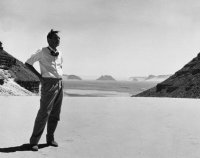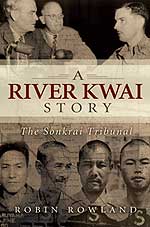For me the most fascinating talk at the David Lean Conference at Queen Mary University in London last last month (where I was speaking on The Bridge on the River Kwai) was by Linda Kaye, a senior researcher at the British Universities Film and Video Council.
Here's an abstract:
In January 1930, when David Lean was 21, he joined Gaumont Sound News as a cutter. He honed his editing skills at a time of rapid transition, as the sound revolution began to transform the film industry. Linda Kaye offers a unique insight into this experimental environment, which was to prove a key formative period in Lean's development. Linda Kaye is Senior Researcher on the 'David Lean and Gaumont Sound News' project at the British Universities Film & Video Council.

My emphasis on the word cutter.
For someone who has spent a great deal of my career in television news, Kaye's presentation was a "hey this is really neat" moment. How many times have I sat in an edit suite, going back to my first VO edit at CTV News (Remembrance Day viz from Ottawa in November 1988) on huge machines of two inch reel to reel video tape, then through Sony betacam to todays' desktop television editing on computer and server?
Well, here is where it all began (at least in the UK).
Kaye explained that in the transition from silent to sound came just at the same time as newsreels were coming alive, the "editor" was closer to what today we would call a news producer. What today we would call an "editor" was called a "cutter."
(And interestngly enough today there is a widely used Avid editing product called Newscutter. )
The special website David Lean and Gaumont Sound News (launched on August 1, 2008, just after the conference) takes you through the earliest days of editing news for the big screen.
There was a race in 1929 and 1930 in a highly competitve market to get the first news with sound on film (SOF or today SOT sound on tape) before the public.
If you want to skip the history (you really shouldn't) and just want to watch the news, you will find the Gaumont archive here.
Watch the item on a 1930 match play golf tournament and ask yourself just how different is it (if you forgive the muddy sound for a moment) with today's live coverage of a golf tournament with all cameras on Tiger Woods.
Listen to Stanley Baldwin warning about the deficit and the need for a balanced budget. (how little has changed! It's black and white not colour, otherwise, it's network news.)
Then there's BREAKING NEWS. "Breaking news" wasn't used, of course, but probably this was the first time the term would have meant something in film/video journalism (unlike today where "breaking news" is so over used that the public is beginning to ignore it). Unfortunately the clip is not on the website but here's the description:
The British R101 airship crashes at Beauvais, France with the loss of 48 lives including a Cabinet Minister. David Lean recalled recording the commentary for the first edition of Gaumont Sound News released early that evening. The newsreels claimed to beat the press to the news story of the year.
Business news combines with street actuality and natural sound (with no idea of the long term consequences of what is happening) with the collapse of the German economy and a run on a Berlin bank in 1931
It's part of a larger project co-sponsored by ITN and Reuters to put many of the old British newsreels on the web. It's called the News of the Twentieth Century Project and you can see British news from the 1920s until the 1970s.
Memo to newspaper managers: Watch the Oscars
Watching those first newsreels cut by David Lean and those other young men (as far as I know there were few young women in the field at the time) from their late teens to early twenties all those years ago, made me think about my newspaper colleagues who are jumping into video.
Video is the latest saviour for newspapers, especially in the United States where newspaper industry has been grossly mismanaged by their corporate overlords. The same emphasis on video is happening in Canada where, so far, newspaper corporate management seems to have kept their heads on their shoulders.
And figures do show that page views on newspaper pages does go up if there is video.
I have seen some great video on newspaper sites. But in many cases, the editing of some of that newspaper video is not as good as the work from those teenage film editors in 1930.
The difference is editing.
Lean first made his mark as a newscutter. He then became a feature film editor. He directed his movies with editing in mind. He directed Oscar winning movies with editing in mind.
So, at work the other day, I stopped an editor friend of mine in the hall and asked her, "How long does it take to become a good editor?"
An executive producer just happened to be passing at the time and she said, "Ten years," as she walked by.
My friend the editor nodded in agreement. "Anyone can read a software manual," she said. "Anyone can top and tail. (cutting a one shot sequence so it is at the beginning you want and the ending you want-RR) But it takes along time to know how craft a piece." (And I would add, save the reporter's or producer's ass if something wasn't shot or not shot properly)
Yet this is the typical job ad we see for newspapers today:
A minimum of xxx years experience in photography is required, training or education in photojournalism and video production is an asset expertise with PhotoShop, Final Cut Pro, slideshows and video is required
I recently saw an ad for a journalism professor at an American university that demanded both a Phd and expertise in Final Cut Pro. (Can you do both at the same time???)
Once, not long ago, a young photographer would pay his/her dues, gain experience, find a style in smaller newspapers before working up to a major metropolitan daily newspaper (like The Daily Planet).
In many ways, today's system works better for young talent. In the desperate search for the younger audience, news organizations are hiring young talent and the good ones are working at their full potential in major news organizations (at least until the next round of layoffs)
Newspaper managers are expecting people to read the manual for Final Cut Pro (newspapers are Mac based operations) and then produce quality work. A tiny talented few can. Many others can't and most will take years to learn the craft. (Only at that point does TV have to watch out. But TV managers get ready)
So newspaper managers mark your calendar so you have time to watch the Oscars. Some star opens the envelope for best achievement in editing. And another star opens the envelope for the best achievement in sound editing.
Then, newspaper manager, ask yourself, if anyone can do this, why are there Oscars for those fields?
Let the shooters shoot. If they're good at stills let them shoot stills. If they can shoot both stills and video beware of multitasking (when I see newspaper colleagues trying to do both I keep wondering, are they going to miss the good video moment when they are shooting stills and miss what what be an award winning still photo moment while fiddling with the video camera?)
So hire a newscutter to edit the video your folks shoot.
Who knows that kid you hire might win an Oscar one day (after that kid moves from news to the movies)
Links to this blog post
Peter Power
This was England by Paul Gorbould
Technorati tags
writing, journalism, A River Kwai Story, Bridge on the River Kwai, David Lean,film, photography,photojournalism, videojournalism, Gaumont Sound News, book
Labels: A River Kwai Story, Avid, Bridge on the River Kwai, David Lean, film, Gaumont Sound News, Mac, news, photography, photojournalism, talkies, videojournalism
This year, 2008, as we've all heard from the superheated publicity, is the one hundredth anniversary of the birth of author Ian Fleming.

The fact that 2008 is also the one hundredth anniversary of the birth of one ot the greatest film directors David Lean, has had less hype.
There have been events in London all year marking the anniversary and one is a conference at Queen Mary University on July 25 and 26, 2008, that "offers an opportunity both to celebrate David Lean's career and to evaluate the nature of his achievement."
You can find out more about the David Lean conference on both the conference website or, if you're on Facebook, by joining the Facebook group David Lean 100th Anniversary Conference QMUL.
Facebook Event page for the conference.
I'll be speaking about "that movie" that it is what many former prisoners called The Bridge on the River Kwai on the afternoon of July 26, officially on "The Reception of The Bridge on the River Kwai among Former Far East Prisoners of War." It was a love hate relationship with that great film for many former POWs.
And I'll tell the conference why.
Hope to see you there.
Technorati tags
writing, London, Burma Thailand Railway, World War II, film,F Force, Prisoner of War,
David Lean, Bridge on the River Kwai, Kwai, book
Labels: A River Kwai Story, Bridge on the River Kwai, Burma Thailand Railway, David Lean, film, London, World War II, writing




